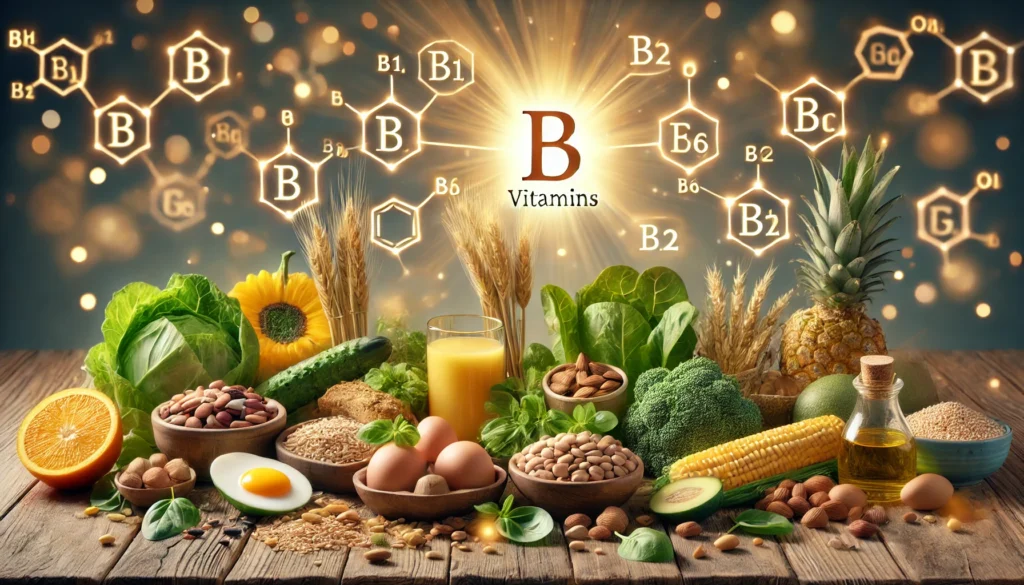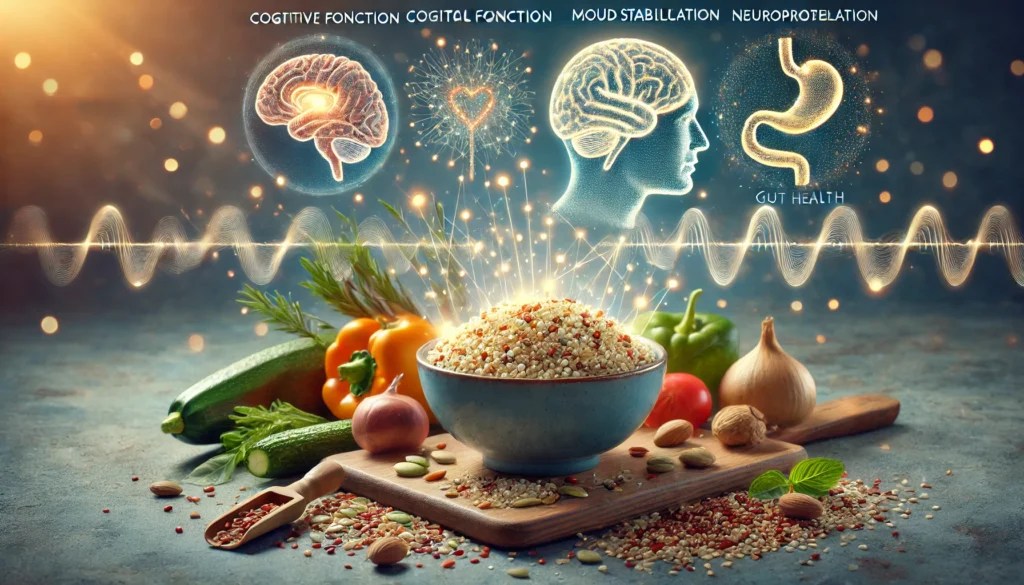Quinoa (Chenopodium quinoa) is a highly nutritious seed that has gained popularity as a superfood in recent years. Often considered a whole grain, quinoa is actually a pseudocereal, a seed that is prepared and consumed in a similar manner to grains. It is packed with essential nutrients, including proteins, vitamins, minerals, and bioactive compounds, making it a valuable addition to a balanced diet. Increasingly, quinoa has been examined for its potential nootropic benefits—substances that may enhance cognitive function and mental performance. This article explores the chemistry, physiological mechanisms, potential nootropic benefits, dosage recommendations, side effects, drug interactions, and other essential information regarding quinoa as a supplement.
You May Also Like:
Quinoa: Potential Nootropic Benefits, Dosage, Side Effects, Interactions, and Other Important Information About This Supplement is an original (NootropicsPlanet) article.
Sources of Quinoa
Quinoa is native to the Andean region of South America, particularly in countries like Peru, Bolivia, and Ecuador. It is often referred to as an “ancient grain” due to its long history of cultivation, dating back over 5,000 years. The seeds of the quinoa plant come in various colors, including white, red, and black, each exhibiting slightly different nutritional profiles. Quinoa is known for its high protein content, providing all nine essential amino acids, making it a complete protein source. Other notable nutrients found in quinoa include:
- Proteins: Quinoa contains approximately 8 grams of protein per cooked cup, which is higher than most grains.
- Fiber: Quinoa is a good source of dietary fiber, promoting digestive health and satiety.
- Vitamins and Minerals: Quinoa is rich in B vitamins, vitamin E, magnesium, iron, potassium, and phosphorus.
- Antioxidants: Quinoa contains various phytochemicals, including flavonoids such as quercetin and kaempferol, which possess antioxidant properties.
Given its comprehensive nutrient profile, quinoa serves as a healthy staple food and a potential nootropic supplement.

Chemistry of Quinoa
The primary components of quinoa responsible for its nutritional and health benefits include proteins, carbohydrates, lipids, vitamins, and minerals. Key compounds include:
- Proteins: Quinoa’s protein content consists primarily of globulins (approximately 70%), followed by prolamins, which contribute to its unique amino acid profile. The presence of lysine, an amino acid often limited in grains, distinguishes quinoa as a superior protein source.
- Complex Carbohydrates: Quinoa is rich in complex carbohydrates, providing a steady source of energy while promoting stable blood sugar levels. The low glycemic index of quinoa is beneficial for maintaining energy and reducing cravings.
- Lipids: Quinoa contains healthy fats, predominantly unsaturated fatty acids, including omega-3 and omega-6 fatty acids, which are essential for brain health.
- Vitamins and Minerals: B vitamins in quinoa, particularly B6, folate, and riboflavin, are crucial for energy metabolism and brain function. Minerals like magnesium and iron support various physiological processes, including oxygen transport and neurotransmitter synthesis.
- Phytochemicals: Quinoa is rich in antioxidants, particularly flavonoids such as quercetin and kaempferol, which exhibit anti-inflammatory and neuroprotective effects.
Physiological Mechanisms of Quinoa in the Body and Brain
Quinoa’s nutritional components contribute to several physiological mechanisms that may enhance cognitive function:
- Energy Production: The complex carbohydrates and proteins in quinoa provide a steady source of energy, essential for maintaining brain function. The presence of B vitamins, particularly B6 and B12, supports energy metabolism by facilitating the conversion of carbohydrates into glucose, the brain’s primary fuel source.
- Neurotransmitter Synthesis: Amino acids derived from quinoa’s protein content are precursors for neurotransmitters like serotonin, dopamine, and norepinephrine. These neurotransmitters play critical roles in mood regulation, focus, and cognitive performance. Adequate protein intake, therefore, supports optimal neurotransmitter synthesis, potentially enhancing cognitive function.
- Antioxidant Defense: Quinoa’s antioxidant-rich profile helps combat oxidative stress, which can lead to neurodegeneration and cognitive decline. Flavonoids such as quercetin and kaempferol protect brain cells from oxidative damage by neutralizing free radicals, promoting cellular health.
- Anti-inflammatory Properties: Chronic inflammation is linked to various neurological disorders, including Alzheimer’s disease and other forms of dementia. Quinoa’s anti-inflammatory compounds may help mitigate neuroinflammation, supporting brain health and cognitive function.
- Gut-Brain Connection: The fiber content of quinoa promotes gut health by supporting the growth of beneficial gut microbiota. A healthy gut microbiome is increasingly recognized for its influence on brain health through the gut-brain axis, impacting mood, cognition, and overall mental well-being.

Nootropic Benefits of Quinoa
The potential nootropic benefits of quinoa stem from its rich nutrient profile and the physiological mechanisms outlined above. While research specifically investigating quinoa as a nootropic is limited, the following benefits may be inferred based on its composition:
- Cognitive Enhancement: The combination of protein, healthy fats, and complex carbohydrates in quinoa provides the brain with a sustained energy supply, which is crucial for cognitive tasks. Improved energy availability can enhance focus, memory, and overall cognitive performance.
- Mood Stabilization: By supporting neurotransmitter synthesis, quinoa may contribute to improved mood and emotional well-being. The presence of B vitamins is particularly significant for individuals experiencing mood fluctuations or mild depressive symptoms.
- Neuroprotection: The antioxidant and anti-inflammatory properties of quinoa can help protect against neurodegeneration and cognitive decline. Regular consumption of quinoa may support long-term brain health and mitigate age-related cognitive decline.
- Improved Metabolic Health: Quinoa’s low glycemic index and high fiber content contribute to stable blood sugar levels, which are vital for cognitive function. Fluctuations in blood sugar can negatively affect concentration and mental clarity, making quinoa a valuable addition to a cognitive-enhancing diet.
- Enhanced Gut Health: By supporting gut health through its fiber content, quinoa may indirectly benefit cognitive function through the gut-brain axis. A healthy gut microbiome is linked to improved mood and cognitive performance, highlighting quinoa’s potential role as a nootropic.

Dosage and Supplementation Guidelines
While quinoa is generally consumed as a food, some individuals may choose to supplement with quinoa extracts or powders to enhance cognitive function. The following dosage guidelines are suggested:
- Dietary Intake: A standard serving of cooked quinoa is approximately 1 cup (185 grams), providing around 8 grams of protein, 5 grams of fiber, and a variety of essential nutrients. Regular inclusion of quinoa in the diet can help meet daily nutritional requirements and support cognitive health.
- Supplemental Forms: Quinoa is available in various supplemental forms, including quinoa protein powders and extracts. These products may be marketed for their protein content or potential cognitive benefits. When using supplements, it is essential to follow manufacturer recommendations regarding dosage.
- Nootropic Dosage: For individuals seeking specific nootropic benefits, incorporating 1-2 servings of quinoa per day in addition to a balanced diet can be beneficial. For those using quinoa extracts, a dosage of 2-5 grams per day may provide cognitive support, although specific research on extract dosages is limited.
Side Effects and Safety
Quinoa is generally considered safe for most individuals. However, some potential side effects and considerations should be noted:
- Saponins: Quinoa seeds contain saponins, natural compounds that can impart a bitter taste and may cause gastrointestinal discomfort in some individuals. Rinsing quinoa thoroughly before cooking can help remove saponins and improve palatability.
- Allergic Reactions: Although rare, some individuals may experience allergic reactions to quinoa. Symptoms may include skin rashes, gastrointestinal distress, or respiratory issues. Those with a history of allergies to related plants in the Amaranthaceae family should exercise caution.
- Oxalates: Quinoa contains oxalates, which can contribute to kidney stone formation in susceptible individuals. Those with a history of kidney stones should consult with a healthcare provider before incorporating large amounts of quinoa into their diet.
- Interaction with Certain Medications: Quinoa’s high fiber content may interfere with the absorption of certain medications. Individuals taking prescription medications should consult their healthcare provider to determine the best approach to quinoa consumption.

Interactions with Other Supplements and Medications
Quinoa is generally safe to consume alongside most supplements and medications. However, certain interactions may warrant caution:
- Mineral Absorption: Quinoa’s high fiber content can inhibit the absorption of certain minerals, particularly when consumed in large quantities. For individuals taking mineral supplements, it may be advisable to space out the consumption of quinoa and these supplements.
- Anticoagulant Medications: Quinoa is rich in vitamin K, which plays a crucial role in blood clotting. Individuals taking anticoagulant medications, such as warfarin, should monitor their vitamin K intake and consult with a healthcare provider for appropriate dietary recommendations.
- Digestive Health Supplements: For individuals taking probiotics or other digestive health supplements, the fiber content in quinoa may support gut health, but excessive consumption could lead to digestive discomfort. Moderation is key to achieving balance.
Risks for Individuals with Certain Health Conditions
While quinoa is a nutritious food, certain health conditions may necessitate caution:
- Kidney Disease: Individuals with kidney disease should be mindful of their protein intake, as excess protein can strain kidney function. Quinoa’s protein content may need to be moderated in these cases.
- Irritable Bowel Syndrome (IBS): The fiber content in quinoa may trigger gastrointestinal symptoms in individuals with IBS. Those with this condition should introduce quinoa gradually into their diet and monitor their symptoms.
- Autoimmune Conditions: Some individuals with autoimmune conditions may experience sensitivities to specific proteins in quinoa. Consulting with a healthcare provider or registered dietitian is advisable for tailored dietary guidance.
Conclusion
Quinoa is a nutrient-dense food that offers a variety of potential nootropic benefits due to its rich composition of proteins, vitamins, minerals, and antioxidants. While research specifically investigating quinoa as a nootropic supplement is still emerging, its ability to support cognitive function, mood stabilization, neuroprotection, and gut health positions it as a valuable addition to a brain-healthy diet. Regular consumption of quinoa as part of a balanced diet can contribute to overall health and well-being. However, individuals considering quinoa supplementation should consult with a healthcare provider to ensure safe and appropriate use, particularly if they have underlying health conditions or are taking medications.
Quinoa’s unique combination of nutrients not only makes it an excellent food choice but also highlights its potential as a nootropic, encouraging further research to explore its cognitive-enhancing properties and mechanisms of action.

References:
- Quinoa: Nutrition Facts and Health Benefits. Retrieved from: https://www.healthline.com/nutrition/8-health-benefits-quinoa
- 4 Health Benefits of Quinoa. Retrieved from: https://health.clevelandclinic.org/quinoa-benefits
- Quinoa: Nutrition, health benefits, and dietary tips. Retrieved from: https://www.medicalnewstoday.com/articles/274745
- Health Benefits, Nutrition Facts, and How to Prepare Quinoa and Quinoa Flakes. Retrieved from: https://www.webmd.com/diet/health-benefits-quinoa
- Nutritional and Functional New Perspectives and Potential Health Benefits of Quinoa and Chia Seeds. Retrieved from: https://pmc.ncbi.nlm.nih.gov/articles/PMC10376479/
Important Note: The information contained in this article is for general informational purposes only, and should not be construed as health or medical advice, nor is it intended to diagnose, prevent, treat, or cure any disease or health condition. Before embarking on any diet, fitness regimen, or program of nutritional supplementation, it is advisable to consult your healthcare professional in order to determine its safety and probable efficacy in terms of your individual state of health.
Regarding Nutritional Supplements Or Other Non-Prescription Health Products: If any nutritional supplements or other non-prescription health products are mentioned in the foregoing article, any claims or statements made about them have not been evaluated by the U.S. Food and Drug Administration, and such nutritional supplements or other health products are not intended to diagnose, treat, cure, or prevent any disease.


